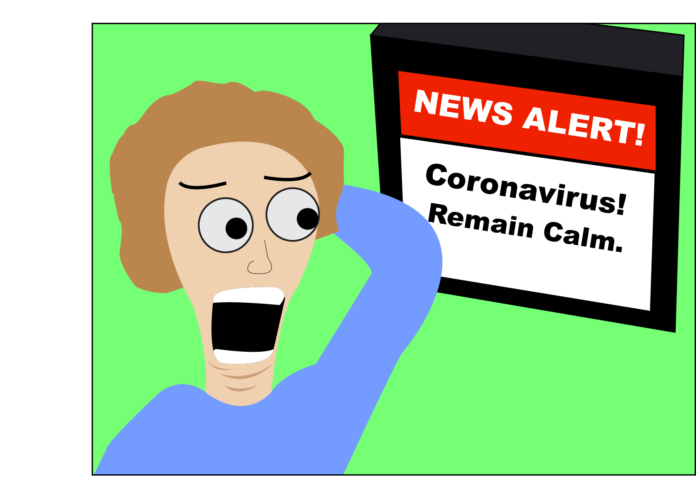In a time when news travels fast and technology travels even faster, it often seems like life can change in an instant. It takes just one post for information to go viral within minutes. Events happening thousands of miles away from you can feel very salient and personal.
Headlines such as the suspected case of coronavirus on Baylor’s campus, for example, may have hit you hard and left you feeling uneasy. A push notification shifts your perception of reality instantaneously.
This sudden shift can easily lead to panic and mental chaos. When something scary or dangerous happens to one person, we begin to subconsciously picture ourselves and how we would react if put in a similar horrible circumstance. In a way, it can feel like one terrible event is collectively happening to all of us when we hear about it.
Hearing about phenomena like coronavirus can feel incredibly scary at first due to its seemingly rapid spread. Instead of resorting to panicking or jumping to conclusions, we should assess situations as they come and become informed on a topic before we let it take over our thoughts.
For days, it was unknown whether the Baylor student who had recently traveled to China had actually contracted coronavirus. Despite the panic that resulted from the initial news of a potential coronavirus case on the Baylor campus, the case was reported negative on Monday. News should be taken seriously but assessed and considered in a rational matter. In this specific situation, for example, there ended up being no urgent threat.
Although coronavirus is dangerous and contagious, almost all affected cases are in China or through people who have recently traveled to the region.
The Guardian reported that the mortality rate of coronavirus is 3%, a little more than 2% above the rate for influenza. Additionally, the rate is probably below 3% as there are likely cases that have gone unreported.
Although many have been affected by the virus, a large majority are not dying because of it. Most of those that have sadly died from coronavirus had weak immune systems or were in poor health prior to contracting it.
Coronavirus has not been declared a public health emergency yet, and the only thing making it more concerning than some other illnesses is the fact that it is a newly discovered track of coronavirus, and no cure has been discovered.
Although coronavirus is a real threat many are facing, before mental panic ensues, realize that there is no reasonable cause for you to be concerned if you are living in the United States and are relatively in good health.
With easily sensationalized news, such as a suspected case of a foreign disease, headlines can easily be taken at face value. Instead of reacting from a short headline or news report tweet, do more reading to gauge your response.
Reading more about coronavirus reveals the limits of the virus and unlikeliness of contracting it. Initial panic can be quelled by the details of the case.
Another way to react to the news would be to simply stay healthy. Getting sleep and exercise, eating a well-balanced diet, and living a life with minimal stress and worry can only lead to our benefit. Taking steps like washing hands, avoiding touching areas like our eyes and mouths and showering regularly is also important in our staying healthy moving forward.
Although hearing about troubling events in the news can lead to quick panic and assumptions, it’s important to learn the facts and use the event to become educated regardless of the situation. It can be tough, but sometimes learning to trust the health professionals in charge and stay informed is our best course of action.
The immediacy of news through the Internet and social media is helpful for getting instant updates on what’s going on in the world. Instead of panicking at the first sign of breaking news, take the time to get a grasp of the full situation. Allow time for more detailed news analysis and updates to come.
Care for your community, but don’t rush to entangle your own sense of safety and stability into everything you see on the news.






